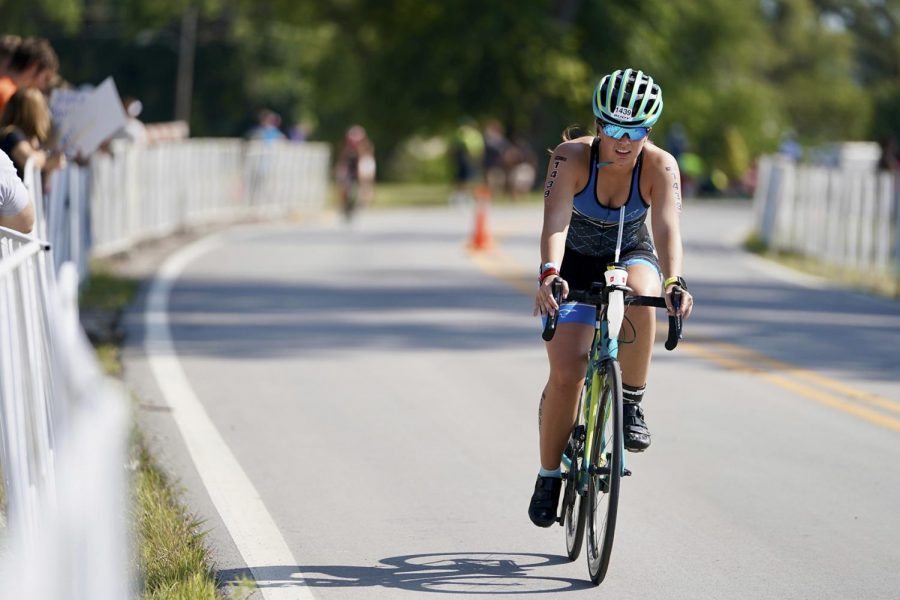Triathlon team looks forward to upcoming season
Athletes return for sport’s second year
Senior Lauren Burgett is a member of the triathlon team.
Many student athletes dedicate themselves to one sport, possibly two, and train during their off season. But this training regimen doesn’t work for triathletes.
Besides performing three different athletic disciplines in one competition, but they also train extensively throughout the entire season until they find a triathlon to participate in.
Sophomore Gillian Cridge said that she trains twice every day. “My training is more intensity-based than volume(-based) due to the distances I race. However, all of my workouts are over an hour. I swim four to five times a week and bike and run every other day. I usually do not have time to train more than two times a day because of school,” said Cridge. On average, she swims 750 meters, bikes 20 kilometers and runs five kilometers in her triathlons.
Seniors Lauren Burgett, Adam Jasiak and Regan Poole are among other athletes who compete in triathlons with the school’s team. Jasiak also described his training as difficult. Due to the fact that until last week Jasiak was still in competition as a member of the men’s swimming team, he said he has to find time to train for the other aspects of the triathlon.
The triathlon process for most of the athletes is long and tedious. Jasiak said, “The triathlon took me about an hour and a half to complete and is very exhausting, especially going from 40 degrees (in the water) to 90 degrees’ it just made it harder to do everything.”
Burgett said, “The process can be tiring at times, especially mid-season. However, the constant (variation in training makes the) long monotonous aspects of long distance racing (easier) for me. Being surrounded with great teammates during practice and races makes (the) struggles of training worth it.”
The triathletes have many competitions around the country in states such as Florida, Alabama and Virginia as well as their home state. Cridge will compete out of the country this summer in Canada, Brazil and possibly Ecuador.
Cridge said, “I have been competing in triathlons since I was 9 years old. I started draft legal triathlon, the style I now compete in, when I was 13. Draft legal triathlon is different than your standard triathlon, because all of the competitors start together and are able to get as close to each other on the bike as needed. The courses are set up in loops, so the officials can watch for penalties, which makes the races more complex. Draft legal triathlon requires more technical skills than a normal sprint triathlon. It is critical to be good at all three components. All of the large races I compete in, I had to qualify for. Competing and training for triathlons is never boring because of the complexity and different technical requirements.”
The athletes all agreed that competing in a triathlon is a unique experience. Burgett said, “For me, racing always shifts from the rush of adrenaline from a mass swim start to a grind when there are only a few people around on the run.”
As many physical activities as these athletes do, triathlons also have benefits that come along with the lengthy training process and the tough competition.
From triathlons Cridge says that the race gives her different kinds of strength. She said, “Of course I have to be strong physically, but it has made me mentally stronger. I am able to push myself farther and harder. I also find myself happier after triathlons and hard workouts because I am awake and doing what I love to do. I have also learned to listen to my body more and know when I need to rest or change something in my training.”







